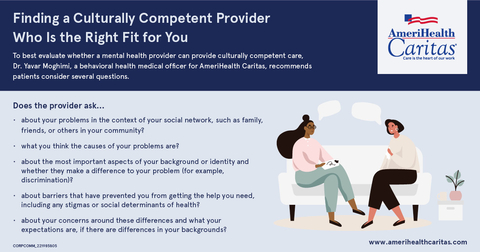AmeriHealth Caritas: Bias and Barriers Impede Mental Health Diagnosis and Treatment
AmeriHealth Caritas: Bias and Barriers Impede Mental Health Diagnosis and Treatment
Five questions to help find a culturally competent mental health provider
NEWTOWN SQUARE, Pa.--(BUSINESS WIRE)--Nearly one in five adults, or about 53 million people, lives with a mental, emotional or behavioral health disorder in the United States.1 Not all people are diagnosed and treated at the same rate, however. This leads to disparities in mental health treatment and diagnosis, says AmeriHealth Caritas, a leader in health care solutions for those most in need and an advocate for whole-person care.
According to the American Psychiatric Association, Black adults are also less likely to be offered either evidence-based medication therapy or psychotherapy, compared to the general population. They are also less likely to receive guideline-consistent care, and less frequently included in mental health research, compared to whites.2
“The mental health care system was not designed with everyone in mind,” said Dr. Yavar Moghimi, a behavioral health medical officer for AmeriHealth Caritas. “Provider bias and systemic barriers cause many Black people to feel that treatment will not be helpful for them.”
Challenges include a need for a more diverse behavioral health workforce as well as a lack of cultural competency, or the necessary skills, behaviors and attitudes to work effectively with different cultural groups. This can lead to misdiagnosis and inadequate treatment and cause mistrust in the patient.3
“Finding a mental health care provider who can include an individual’s unique culture, beliefs and values into their care is important for treatment to be successful,” explained Moghimi.
The barriers vulnerable populations face when seeking mental health care and diagnosis can have significant consequences, especially in non-white and marginalized communities. In 2019, suicide became the second leading cause of death for Black teens and young adults ages 15 to 24,4 and Black women remain one of the most undertreated U.S. populations for depression.5
Moghimi recommends patients consider several questions to best evaluate whether a mental health provider is the right fit and can provide culturally competent care:
- Does the provider ask about your problems in the context of your social network, such as family or friends, others in your community?
- Does the provider ask you what you think the causes of your problems are?
- Does the provider ask about the most important aspects of your background or identity and whether they make a difference to your problem (i.e. discrimination)?
- Does the provider ask about barriers that have prevented you from getting the help you need, including any stigmas or social determinants of health?
- If there are differences in your backgrounds, does the provider ask about your concerns around these differences and what your expectations are?
These questions are some examples of what culturally competent mental health providers should be asking when trying to provide responsive care in the context of patients’ culture and inequities that may be a part of their daily lives.
About AmeriHealth Caritas
AmeriHealth Caritas is one of the nation’s leaders in health care solutions for those most in need. Operating in 12 states and the District of Columbia, AmeriHealth Caritas serves approximately 5 million Medicaid, Medicare, and Children’s Health Insurance Program (CHIP), and Health Insurance Marketplace® members through its integrated managed care products, pharmaceutical benefit management and specialty pharmacy services, and behavioral health services. Headquartered in Pennsylvania, AmeriHealth Caritas is a mission-driven organization with nearly 40 years of experience serving low-income and chronically ill populations. For more information, visit www.amerihealthcaritas.com.
1 “Mental Illness,” National Institute of Mental Health, 2022, https://www.nimh.nih.gov/health/statistics/mental-illness.
2 “Mental Health Disparities: African Americans,” American Psychiatric Association, 2017, psychiatry.org/File%20Library/Psychiatrists/Cultural-Competency/Mental-Health-Disparities/Mental-Health-Facts-for-African-Americans.pdf
3 “Identity and Cultural Dimensions: Black/African American,” National Alliance on Mental Illness, https://www.nami.org/Your-Journey/Identity-and-Cultural-Dimensions/Black-African-American
4 “Mental and Behavioral Health - African Americans,” U.S. Department of Health and Human Services, Office of Minority Health, 2021, minorityhealth.hhs.gov/omh/browse.aspx?lvl=4&lvlid=24.
5 Tamara Nelson, et al., “Do I Really Need to Go and See Somebody? Black Women’s Perceptions of Help-Seeking for Depression,” Journal of Black Psychology, Vol. 46, No. 4, 2020, pp. 263–286.
Contacts
Shannon Reyes
Tel: 1-215-625-1134
sreyes1@amerihealthcaritas.com

